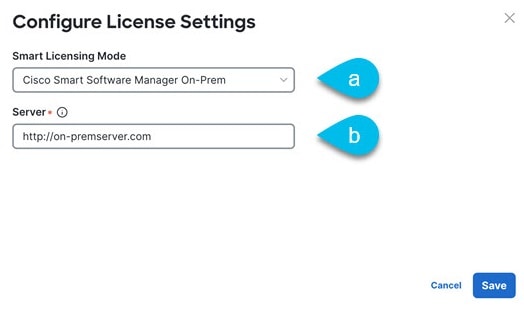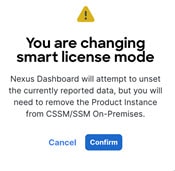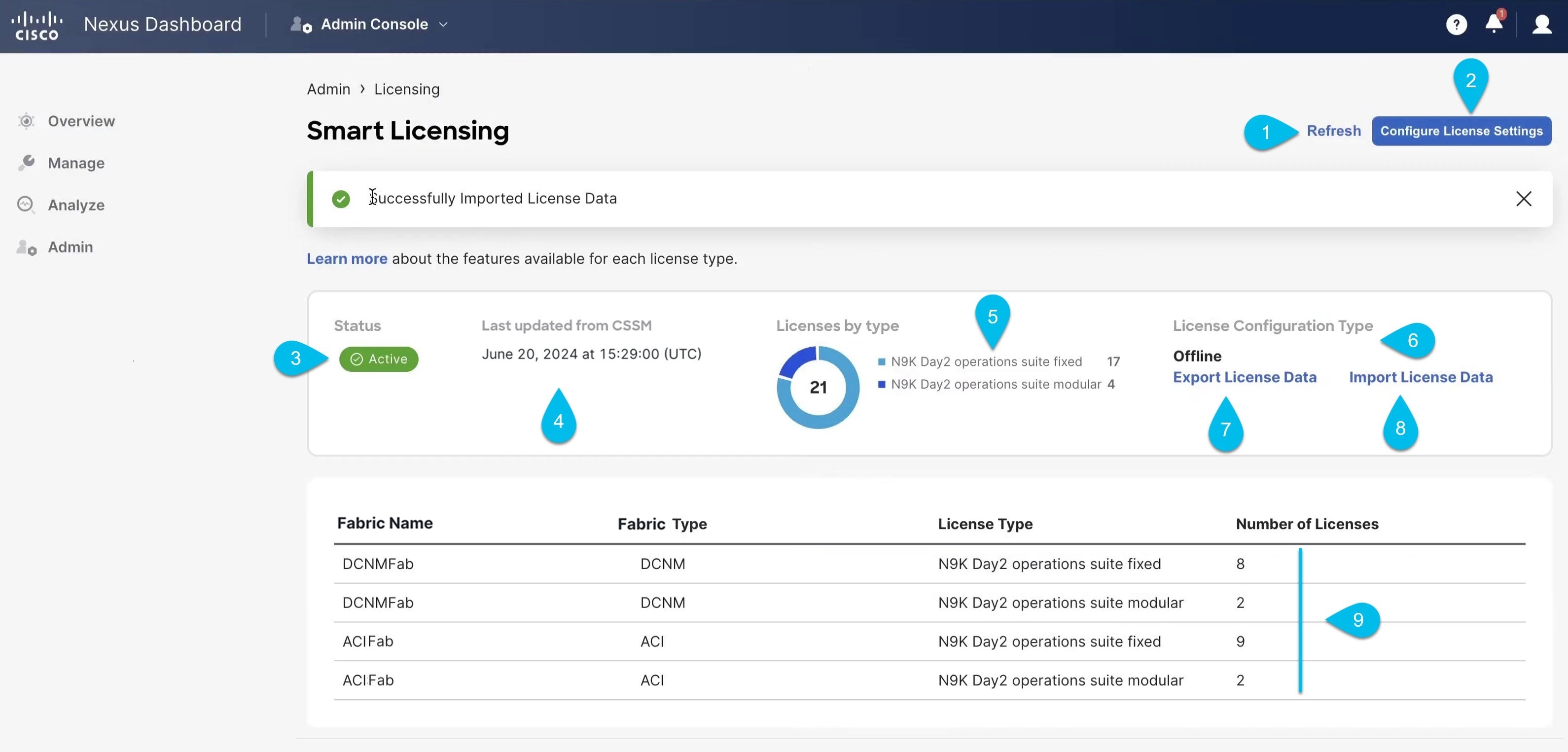Smart Licensing Overview
Cisco Nexus Dashboard Smart Licensing is a software management platform that manages all Nexus Dashboard and services product licenses.
Beginning with release 3.1.1, you can establish connectivity to the Cisco Smart Software Manager (CSSM) from your Nexus Dashboard cluster and track the inventory and license consumption by the Nexus Dashboard Insights service.
Nexus Dashboard supports following types licenses for connecting to the CSSM server:
-
Direct Connect to CSSM: This is the most commonly used network setting. The Nexus Dashboard must have an Internet connectivity so that the Nexus Dashboard can send RUM reports to the CSSM directly. The DNS must be configured and the CSSM hostname (https://smartreceiver.cisco.com/licservice/license) must be pingable.
-
Proxy: With this setting, the Nexus Dashboard does not have Internet connectivity. The Nexus Dashboard sends RUM reports to the CSSM using your web server. Make sure the web server is properly configured to allow the smart licensing messages to pass through the firewall and to reach the destination (https://smartreceiver.cisco.com/licservice/license).
Note that there is no separate proxy configuration specific to licensing, the cluster-wide proxy configuration is used.
-
Cisco Smart Software Manager On-Prem: In OnPrem mode, ND can report to a Smart Software Manager(SSM) On-Prem using the SSM OnPrem’s CSLU URL. The SSM acts as an intermediate server that resides within the local network, with an uplink to Cisco’s SSM for periodic sync. For details on the SSM OnPrem, please refer to SSM OnPrem Cisco docs.
-
Offline: Nexus Dashboard also supports Offline reporting mode for deployments that also don’t have access to an SSM OnPrem. In Offline mode, the users download the usage files from ND, upload the usage files to Cisco SSM which generates an ACK file, and upload that ACK file back into ND to sync usage status. For further details, please refer to Cisco Licensing FAQ on Offline mode.
Smart Licensing Guidelines and Limitations
The following guidelines apply when enabling CSSM connectivity for your Nexus Dashboard:
-
While this release allows you to see the licenses that are currently in use, it does not enforce the licensing policy and is used for informational purposes only.
-
When configuring a proxy for CSSM connectivity, the proxy server must be configured for HTTPS traffic, while the proxy server itself must be HTTP.
-
Beginning with Nexus Dashboard Release 3.2.x, On-Prem and Offline type licences can be configured under Smart Licensing.
-
In this release, only the Nexus Dashboard Insights service can use the smart licensing feature configured at the platform level.
Only the number of devices which consume licenses is shown in this release.
-
In this release, only two license types are supported:
N9K Day2 operations suite fixedandN9K Day2 operations suite modular. -
License consumption shown in the Nexus Dashboard UI screens is updated every 15 seconds for NDFC and NX-OS fabrics and every 15 minutes for ACI fabrics.
In addition, license information is updated any time a fabric or a switch is added or removed.
Licensing Details
The following table lists the features available in each licensing tier.
|
ESSENTIALS Basic Device and Network Monitoring features |
ADVANTAGE Device Network Monitoring and Troubleshooting Tools |
PREMIER Advantage Network Analytics and Day 2 Operations |
||
|
Inventory Get information about the number of switches and other elements in your fabric. |
Global, fabric, switch, ports, endpoints, VMs |
|
|
|
|
L3 neighbors, IPv4/v6 routing tables*, capacity |
|
|
|
|
|
Topology Get information about the number of switches and other elements in your fabric. |
One fabric at a time |
|
|
|
|
Across fabrics |
|
|
|
|
|
Anomalies Detect problems in your network faster. |
Basic (switch and interface down only) |
|
|
|
|
All |
|
|
|
|
|
Advisories EoS/EoL Notifications for Hardware and Software, PSIRTs and other recommendations. |
Severity 1 PSIRTs and EoS |
|
|
|
|
Best Practices, Field Notices, Sustainability |
|
|
|
|
|
Conformance View interfaces, L3 neighbors, connected endpoints and more! |
Hardware/Software lifecycle & EoS |
|
|
|
|
Verified scale |
|
|
|
|
|
Analytics and Troubleshooting Get actionable data-driven insights to optimize network performance and security. |
Sustainability Bug Scan, CAM Analyzer |
|
|
|
|
Flow and Traffic Connectivity and Explorer Delta (pre/post) Compliance |
|
|
|
|
|
Software Upgrade Support |
Basic upgrade checks & TAC Assist |
|
|
|
|
Full upgrade analytic |
|
|
|
|
|
AI/ML & QoS |
PFC/ECN (NX-OS/NDFC Only) |
|
|
|
|
Microbursts |
|
|
|
|
|
Integrations |
VMware |
|
|
|
|
DNS, Panduit |
|
|
|
|
|
All (Splunk, ServiceNow, AppDynamics, etc) |
|
|
|
|
|
Others |
Journey, ND multi-cluster support |
|
|
|
|
Multicast PIM, IGMP (NX-OS/NDFC only), log collector, snapshots (ACI only) and snapshot assistant |
|
|
|
|
|
Customized alerts and compliance rules, customizable dashboards, pre-change analysis (ACI only) |
|
|
|
Enabling Smart Licensing
-
Ensure that your Nexus Dashboard cluster can connect to the Smart Licensing service.
Verify if your cluster can already access the licensing service at https://smartreceiver.cisco.com/licservice/license, else you may need to configure a proxy server for your cluster:
To Enable Smart Licensing:
-
Navigate to your Nexus Dashboard cluster’s Admin Console.
-
From the left-hand navigation pane, choose Admin > System Settings.
-
In the System Settings page, click the Edit button in the Proxy Settings tile.
-
In the Proxy Configuration screen, click Add Server.
-
Provide proxy server information:
-
From the Type drop down, select
HTTPSas appropriate.Smart licensing supports HTTPS proxy servers only.
-
In the Server field, provide the IP address of the proxy server.
-
If your proxy server requires authentication, provide the Username and Password.
Then click the checkmark icon to save the proxy server.
-
Generate a Smart Licensing token
To generate a Smart Licensing token:
-
Navigate to https://software.cisco.com/software/smart-licensing/inventory.
-
Select your virtual account.
-
Under Product Instance Registration Token, click New Token.
-
Define the expiration for your new token and click Create Token.
Configuring Smart Licenses
-
Configure your Nexus Dashboard cluster to enable smart licensing.
To Configure your Smart Licenses:
-
Log in to your Nexus Dashboard cluster’s Admin Console
-
Navigate to Admin > Licensing.
-
Click Configure License Settings.
-
Select between the Licensing Modes:
-
Direct Connect to CSSM
-
HTTPS Proxy
-
Cisco Smart Software Manager On-Prem
-
Offline
-
-
Enter the Server URL.

For offline licensing mode, you have to Export License Data, upload it to CSSM server to get the ACK file, then click on Import License Data to backup it to ND.
-
-
In the Product Instance ID Token field, provide the token you generated in the previous procedure.
-
Click Save.
-
If you are Configuring Smart Licenses to change the smart licensing mode, you may get a warning to Confirm before migration.

Viewing Current License Usage
After you have configured your Nexus Dashboard to connect to the CSSM, you can view the currently used licenses in the Admin Console.
Navigate to Admin > Licensing page:

-
Refresh: Refresh the Smart Licensing Page.
-
Configure License Settings: Update the Configure License Settings page, with details like, Name and Server settings.
-
Status : Shows the status of the licensing.
-
Last updated from CSSM: Indicates the time stamp when ND last received an ACK from CSSM.
-
Licenses by type: Shows the Licenses by types
-
License Configuration Type: Indicates the type of license. It can be of the following types:
-
Direct Connect to CSSM
-
HTTPS Proxy
-
Cisco Smart Software Manager On-Prem
-
Offline
-
-
Export License Data: Download the currently used License Data file in the browser which can then be uploaded to CSSM.
-
Import License Data: To upload the ACK file from CSSM to the Nexus Dashboard.
-
Fabrics: Shows a list of fabrics in tabular form, with number of licenses and type associated with each fabric.
Trademarks
THE SPECIFICATIONS AND INFORMATION REGARDING THE PRODUCTS IN THIS MANUAL ARE SUBJECT TO CHANGE WITHOUT NOTICE. ALL STATEMENTS, INFORMATION, AND RECOMMENDATIONS IN THIS MANUAL ARE BELIEVED TO BE ACCURATE BUT ARE PRESENTED WITHOUT WARRANTY OF ANY KIND, EXPRESS OR IMPLIED. USERS MUST TAKE FULL RESPONSIBILITY FOR THEIR APPLICATION OF ANY PRODUCTS.
THE SOFTWARE LICENSE AND LIMITED WARRANTY FOR THE ACCOMPANYING PRODUCT ARE SET FORTH IN THE INFORMATION PACKET THAT SHIPPED WITH THE PRODUCT AND ARE INCORPORATED HEREIN BY THIS REFERENCE. IF YOU ARE UNABLE TO LOCATE THE SOFTWARE LICENSE OR LIMITED WARRANTY, CONTACT YOUR CISCO REPRESENTATIVE FOR A COPY.
The Cisco implementation of TCP header compression is an adaptation of a program developed by the University of California, Berkeley (UCB) as part of UCB’s public domain version of the UNIX operating system. All rights reserved. Copyright © 1981, Regents of the University of California.
NOTWITHSTANDING ANY OTHER WARRANTY HEREIN, ALL DOCUMENT FILES AND SOFTWARE OF THESE SUPPLIERS ARE PROVIDED “AS IS" WITH ALL FAULTS. CISCO AND THE ABOVE-NAMED SUPPLIERS DISCLAIM ALL WARRANTIES, EXPRESSED OR IMPLIED, INCLUDING, WITHOUT LIMITATION, THOSE OF MERCHANTABILITY, FITNESS FOR A PARTICULAR PURPOSE AND NONINFRINGEMENT OR ARISING FROM A COURSE OF DEALING, USAGE, OR TRADE PRACTICE.
IN NO EVENT SHALL CISCO OR ITS SUPPLIERS BE LIABLE FOR ANY INDIRECT, SPECIAL, CONSEQUENTIAL, OR INCIDENTAL DAMAGES, INCLUDING, WITHOUT LIMITATION, LOST PROFITS OR LOSS OR DAMAGE TO DATA ARISING OUT OF THE USE OR INABILITY TO USE THIS MANUAL, EVEN IF CISCO OR ITS SUPPLIERS HAVE BEEN ADVISED OF THE POSSIBILITY OF SUCH DAMAGES.
Any Internet Protocol (IP) addresses and phone numbers used in this document are not intended to be actual addresses and phone numbers. Any examples, command display output, network topology diagrams, and other figures included in the document are shown for illustrative purposes only. Any use of actual IP addresses or phone numbers in illustrative content is unintentional and coincidental.
Cisco and the Cisco logo are trademarks or registered trademarks of Cisco and/or its affiliates in the U.S. and other countries. To view a list of Cisco trademarks, go to this URL: http://www.cisco.com/go/trademarks. Third-party trademarks mentioned are the property of their respective owners. The use of the word partner does not imply a partnership relationship between Cisco and any other company. (1110R)
© 2017-2024 Cisco Systems, Inc. All rights reserved.
First Published: 2023-03-07
Last Modified: 2023-03-07
Americas Headquarters
Cisco Systems, Inc.
170 West Tasman Drive
San Jose, CA 95134-1706
USA
http://www.cisco.com
Tel: 408 526-4000
800 553-NETS (6387)
Fax: 408 527-0883